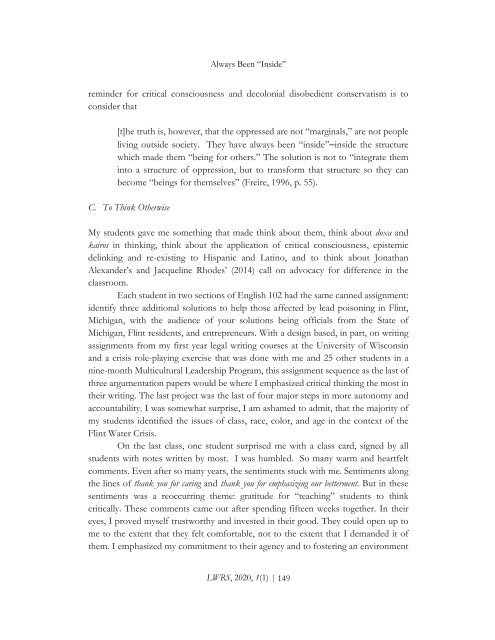LWRS June 2020 Volume 1, Issue 1
Inaugural Issue co-edited by Yndalecio Isaac Hinojosa and Isabel Baca
Inaugural Issue co-edited by Yndalecio Isaac Hinojosa and Isabel Baca
Create successful ePaper yourself
Turn your PDF publications into a flip-book with our unique Google optimized e-Paper software.
Always Been “Inside”<br />
reminder for critical consciousness and decolonial disobedient conservatism is to<br />
consider that<br />
[t]he truth is, however, that the oppressed are not “marginals,” are not people<br />
living outside society. They have always been “inside”–inside the structure<br />
which made them “being for others.” The solution is not to “integrate them<br />
into a structure of oppression, but to transform that structure so they can<br />
become “beings for themselves” (Freire, 1996, p. 55).<br />
C. To Think Otherwise<br />
My students gave me something that made think about them, think about doxa and<br />
kairos in thinking, think about the application of critical consciousness, epistemic<br />
delinking and re-existing to Hispanic and Latino, and to think about Jonathan<br />
Alexander’s and Jacqueline Rhodes’ (2014) call on advocacy for difference in the<br />
classroom.<br />
Each student in two sections of English 102 had the same canned assignment:<br />
identify three additional solutions to help those affected by lead poisoning in Flint,<br />
Michigan, with the audience of your solutions being officials from the State of<br />
Michigan, Flint residents, and entrepreneurs. With a design based, in part, on writing<br />
assignments from my first year legal writing courses at the University of Wisconsin<br />
and a crisis role-playing exercise that was done with me and 25 other students in a<br />
nine-month Multicultural Leadership Program, this assignment sequence as the last of<br />
three argumentation papers would be where I emphasized critical thinking the most in<br />
their writing. The last project was the last of four major steps in more autonomy and<br />
accountability. I was somewhat surprise, I am ashamed to admit, that the majority of<br />
my students identified the issues of class, race, color, and age in the context of the<br />
Flint Water Crisis.<br />
On the last class, one student surprised me with a class card, signed by all<br />
students with notes written by most. I was humbled. So many warm and heartfelt<br />
comments. Even after so many years, the sentiments stuck with me. Sentiments along<br />
the lines of thank you for caring and thank you for emphasizing our betterment. But in these<br />
sentiments was a reoccurring theme: gratitude for “teaching” students to think<br />
critically. These comments came out after spending fifteen weeks together. In their<br />
eyes, I proved myself trustworthy and invested in their good. They could open up to<br />
me to the extent that they felt comfortable, not to the extent that I demanded it of<br />
them. I emphasized my commitment to their agency and to fostering an environment<br />
<strong>LWRS</strong>, <strong>2020</strong>, 1(1) | 149





